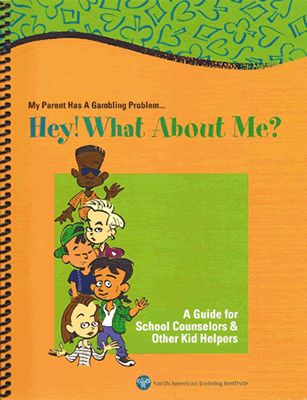|
|
|
|
|
 Youth Youth
|
My Parent Has A Gambling Problem…Hey! What About Me?
|
|
FAQ About Youth Gambling – Research Reveals
- Kids don’t gamble…wanna bet?
- Nearly 90% of all teens have gambled at least once in their lifetime;
- Playing poker is the norm for high school-age kids;
- Playing poker is viewed by kids as a ‘sport’, not gambling. No wonder…televised poker tournaments include commentators as do other sport broadcasts and the players become famous, just like athletes.
- The appeal of poker is understandable; unlike ‘sports’ where players spend years training, poker does not require such discipline. According to Dr. Rena Gupta, McGill University, Department of Psychiatry, “ This sport is quickly becoming knows for ‘nobodies’ who go on to win millions of dollars. “
- Why do kids gamble?
- Kids try whatever is culturally popular – gambling is promoted with exciting images of instantaneous wealth, power, status and freedom.
- Problems at home- kids from unstable families may see gambling as an escape from violence or abuse.
- Role modeling- gambling can often be a family affair. Family trips to the race track, scratch-off lottery tickets given to youngsters by respected adults. The most common way that youngsters are introduced to the exciting and magical world of gambling is via their parents or adult relative.
- Low self-esteem – people love winners. For those kids who lack self-esteem, winning a bet provides an instant, through temporary, boost in peer-esteem. Gambling makes them feel important…for the moment.
- Avoidance of pain and grief – a youngster who experiences losses, trauma, or isolation may turn to something to ease the pain…that something may be alcohol, drugs…or gambling.
- What types of gambling do kids prefer?
- Research indicates that youngster’s favorite forms of gambling are:
- Cards – such as poker;
- Games of personal skill such as shooting pool
- Sports betting; and
- Lotteries
- Is youth gambling harmful? Research indicates:
- Youth problem gamblers are at an increased risk of delinquency, crime and poor academic performance.
- Many kids start gambling before age 11, earlier than they experiment with drugs and alcohol. Some researchers believe that gambling may be a gateway to other harmful behaviors
- Gambling problems in youth have often gone unnoticed as they are difficult to measure and observe. In contrast to alcohol, tobacco and other drug use, there are no visible signs of intoxication or consumption.
- Some school practices may unwittingly be promoting gambling through lottery draws, casino nights and permitting card playing within schools.
- Even for kids who don’t develop a problem with gambling, spending time in the fantasy realm of ‘get rich quick’ may interfere with other activities that may actually move a youngster toward his or her lifetime goals.
What Others Say…about NATI education and prevention work.
| Price: $250.00 |
 |
 |
|

|
|
|
|